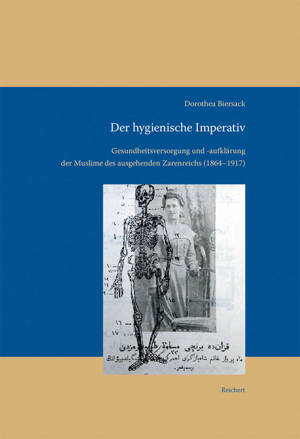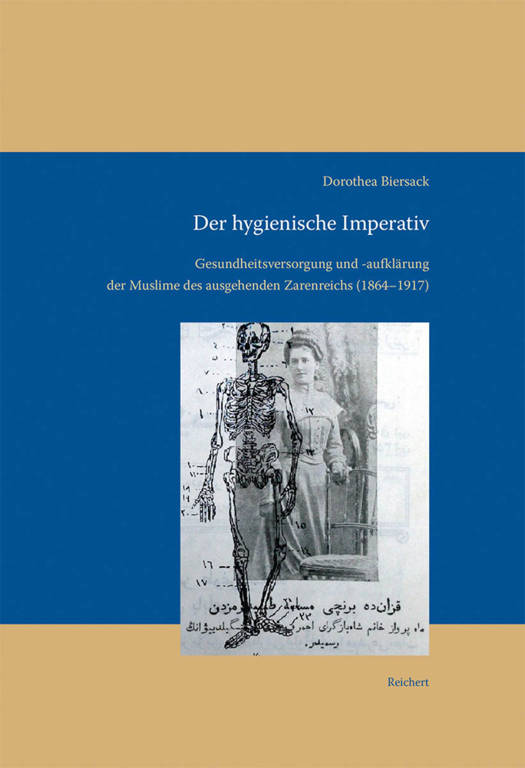
- Retrait gratuit dans votre magasin Club
- 7.000.000 titres dans notre catalogue
- Payer en toute sécurité
- Toujours un magasin près de chez vous
- Retrait gratuit dans votre magasin Club
- 7.000.0000 titres dans notre catalogue
- Payer en toute sécurité
- Toujours un magasin près de chez vous
Der Hygienische Imperativ
Gesundheitsversorgung Und -Aufklarung Der Muslime Des Ausgehenden Zarenreichs (1864-1917)
Dorothea Biersack
236,95 €
+ 473 points
Description
English summary: The attempt to establish a health system on the basis of modern European scientific medical standards meant a great adaptation challenge for the traditional people in the Russian Empire. Particularly for the Muslim minority the pressure to adapt to the new regulations increased the risk of losing their own cultural identity and can be understood as another manifestation of mission civilisatrice. Thus the study analyzes the adaptation of the Muslim population to the so-called medicalization in the governorates of Kazan' and Ufa. Instead of carrying on the agens - patiens dichotomy of prevailing medicalization and colonial theories, the focus is on the Muslim perception of the new medical culture and on its creative use for their own benefit. The first part of of the study outlines the development of the public health system in the region and examines the demand for the offered medical services. Contrary to what the complaints of the physicians suggest, Muslims were in fact not unwilling in general to consult them, but circumstances, such as language barriers, vast distances, and reciprocal distrust, restrained their access to medical help. The second part analyzes Muslim media, such as health manuals and journals. It is noticeable that they contain a lot of information about excess nutrition, alcohol abuse, and neurasthenia, whereas nearly no information is given about scurvy, a widespread disease among the Tatar and Bashkir population those days. Apparently the authors were mainly influenced by Western discourses and rather unaware of the problems of their own people. Nonetheless, the divergent voices from progressive women to conservative theologians were all unified in the common goal of teaching the Muslim population to keep themselves healthy in accordance with modern health rules. Instead of playing sciences and Islamic laws off against each other, most of the writers combined them and thereby formed a scientific-religious alliance which contrasted the islamophobia of public health institutions. The study proves how this alliance helped to enhance a positive modern Islamic self-awareness by finding Islamic solutions for health problems of modern societies. German description: Die Etablierung des Gesundheitswesens und die damit verbundene Umstellung von traditionalen auf naturwissenschaftliche Krankheitskonzepte verlangten der Bevolkerung des ausgehenden Zarenreichs eine Anpassungsleistung ab, die fur die muslimische Minderheit einen weiteren Schauplatz im Konflikt zwischen Selbstbehauptung und Akkulturation aufmachte. Die Fragestellung, wie sich Wolgatataren und Baschkiren mit der Medikalisierung in den Gouvernements Ufa und Kasan arrangiert haben, soll jedoch nicht einfach die Tater-Opfer-Dichotomie von Medikalisierungs- und Kolonialismustheorien fortschreiben oder die Muslime einmal mehr vor die Weggabelung Anpassung - Abschottung stellen. Vielmehr liegt der Fokus auf ihrem kreativen Umgang mit dem Neuen. Zunachst wird anhand von Daten der Gesundheitsbehorden dargestellt, wie die Medikalisierung in der Region vonstattenging, auf welche Nachfrage das medikale Angebot stiess und wie es mit der Ausbildung muslimischer Arzte und Arztinnen bestellt war. Dabei erweist sich die Gegenuberstellung von Wolgatataren und Baschkiren als hilfreich, denn sie bricht die Einheit "der" Muslime auf und eroffnet Einsichten in die ungleiche Gesundheitspolitik der Behorden gegenuber den beiden Ethnien. Diese wirkte sich auf die Akzeptanz der Medizin hochst unterschiedlich aus und lasst die Klagen der Landarzte uber die mangelnde Compliance der muslimischen Bevolkerung in einem anderen Licht erscheinen. Die Krankenstatistiken gewahren dabei Einblick in die Verbreitung von Skorbut als Symptom fur die tiefgreifende Verarmung der baschkirischen und tatarischen Landbevolkerung.Der zweite Teil analysiert gesundheitsrelevante Texte, die sich an muslimische Leser richten. Sie bringen die Vielstimmigkeit der Autoren von Gesundheitsthemen uber die theologische Auseinandersetzung mit der medizinischen Forschung bis hin zur Diskussion umstrittener Gesundheitsmassnahmen wie der Hagg-Quarantane zum Ausdruck. Wenn Zivilisationskrankheiten wie Neurasthenie dabei wesentlich mehr Raum einnehmen als der Skorbut, belegt dies die Kluft der Autoren zur Lebenswelt derer, die sie zu gesundheitsadaquatem Verhalten erziehen wollten, sowie ihre Orientierung an westeuropaischen Diskursen. Hier wie dort tritt die Moderne einerseits als Heilsbringerin in Erscheinung und andererseits als degenerative Gefahrderin der Spezies Mensch. Das Charakteristische der russlandmuslimischen Texte besteht in der Verbindung von naturwissenschaftlichen Argumenten mit Versatzstucken aus der Prophetenmedizin zu einer naturwissenschaftlich-religiosen Allianz. Diese Allianz ebnete zum einen der Medikalisierung den Weg und diente zum anderen der Konsolidierung eines modernen islamischen Selbstbewusstseins. Wie dazu die Hygiene beitrug, liegt im Augenmerk der Untersuchung.
Spécifications
Parties prenantes
- Auteur(s) :
- Editeur:
Contenu
- Nombre de pages :
- 280
- Langue:
- Allemand
- Collection :
- Tome:
- n° 17
Caractéristiques
- EAN:
- 9783954902941
- Date de parution :
- 14-02-18
- Format:
- Livre relié
- Format numérique:
- Genaaid
- Dimensions :
- 170 mm x 240 mm
- Poids :
- 679 g

Les avis
Nous publions uniquement les avis qui respectent les conditions requises. Consultez nos conditions pour les avis.






